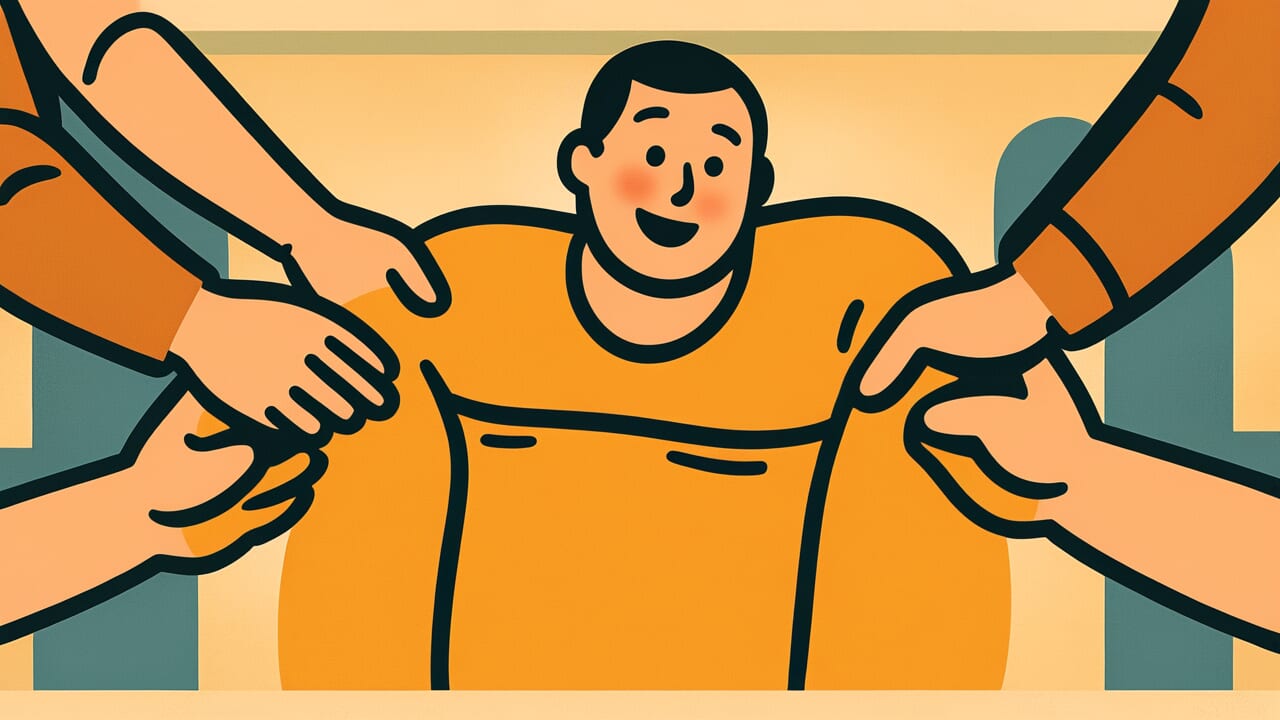How to Read “Won’t cut my belly for a debt, but will cut it for compassion”
On no hara wa kiranedo nasake no hara wa kiru
Meaning of “Won’t cut my belly for a debt, but will cut it for compassion”
This proverb reveals a curious truth about human nature. People won’t risk their lives for someone they owe a debt to, but they will for someone who appeals to their emotions.
It shows that emotional connections move us more deeply than formal obligations. Compassion touches our hearts more powerfully than duty ever could.
You might use this saying when explaining why immediate sympathy drives action more than calculated obligation. For example, you might delay repaying someone who helped you years ago.
But when you see someone suffering right now, you can’t just stand by. This captures that exact human psychology.
Even today, emotional appeals move people more than logic or duty. We are creatures who act from genuine empathy and sympathy, not just calculation.
This proverb teaches us that truth about ourselves.
Origin and Etymology
No clear historical record shows when this proverb first appeared. However, its structure offers interesting insights into its meaning.
“Cutting one’s belly” refers to seppuku, the samurai ritual suicide. This was the ultimate act of taking responsibility with one’s life.
The proverb contrasts two types of human relationships through this life-or-death choice.
“On” means obligation or debt for benefits received. It carries a sense of duty and formal responsibility.
“Nasake” means compassion that springs from witnessing someone’s pain. It’s more emotional and spontaneous than obligation.
During the Edo period, duty and compassion were constantly compared in samurai culture. Interestingly, this proverb recognizes that compassion moves people more than calculated obligation.
In the samurai world, loyalty and debt to one’s lord were absolute. Yet this saying reveals a paradox.
Pure sympathy for someone suffering before your eyes shakes the heart more deeply. This expression likely came from common people’s wisdom.
It sharply captures the essence of human emotion.
Usage Examples
- I keep putting off repaying my longtime benefactor, but I can’t ignore a crying child. That’s “Won’t cut my belly for a debt, but will cut it for compassion.”
- I help people in trouble now before those I owe favors to. I guess that’s “Won’t cut my belly for a debt, but will cut it for compassion.”
Universal Wisdom
This proverb has survived because it touches a fundamental truth about the human heart. We understand rationally that duty and obligation matter.
But what actually moves us are the raw emotions right before our eyes.
Obligation belongs to the past. It’s certainly important, but it lives in memory. And memories fade with time.
Compassion, however, exists in the present moment. Someone suffering now, crying now, struggling now. That urgency of “now” shakes our hearts violently.
Perhaps humans naturally respond to direct emotional resonance more than calculation or duty. This isn’t weakness. It’s proof of our humanity.
If we were completely rational beings who calculated everything, society would be much colder and mechanical.
This proverb emerged from a culture that valued duty and compassion. Yet it reveals a paradox: compassion moves people more powerfully than duty.
Our ancestors saw through the gap between appearance and reality, ideal and truth. They understood human nature deeply.
And they didn’t reject it. They accepted it as it was. This is simply how humans are.
This profound understanding of humanity is the universal wisdom this proverb holds.
When AI Hears This
This proverb functions as what game theory calls a “commitment device.” Commitment means binding your own actions in advance to change others’ behavior.
You respond rationally to those you owe debts. But for those who show you compassion, you’d give even your life.
By displaying this extreme behavior pattern, you build a reputation as someone who overreacts to compassion. What happens then?
Others calculate: “If I show this person compassion, they’ll never betray me.” This creates a strategic advantage.
Here’s the interesting part. If everyone always acted on pure rational self-interest, nobody would help anyone. The risk of betrayal is too high.
But when some people “cut their belly for compassion,” cooperation networks form around them. Long-term, network members gain more benefits than isolated rational actors.
So “seemingly irrational loyalty” is actually “advertising cost to attract cooperators.” It’s like companies spending heavily on quality guarantees.
Accept short-term losses to acquire the long-term asset of trust. This proverb captures the essence of strategic investment in relationships.
Lessons for Today
This proverb teaches us to honestly acknowledge how our hearts move. We often know intellectually that we should fulfill duties and obligations.
But we struggle to act on them. You don’t need to blame yourself. Humans are simply like this, the proverb tells us.
At the same time, it warns against being swept away by immediate emotions. Helping someone in trouble now is wonderful.
But don’t forget past debts. Don’t just follow emotions. Sometimes pause and remember truly important relationships.
In modern society, social media constantly shows us people in trouble. Our hearts are constantly stirred. We can’t respond to everything.
That’s why understanding how your heart moves matters. Balance emotion and reason carefully.
Treasure the moments when your heart moves. That’s proof of your humanity. But also remember quiet duties and obligations.
Valuing both is the key to building rich relationships.



Comments